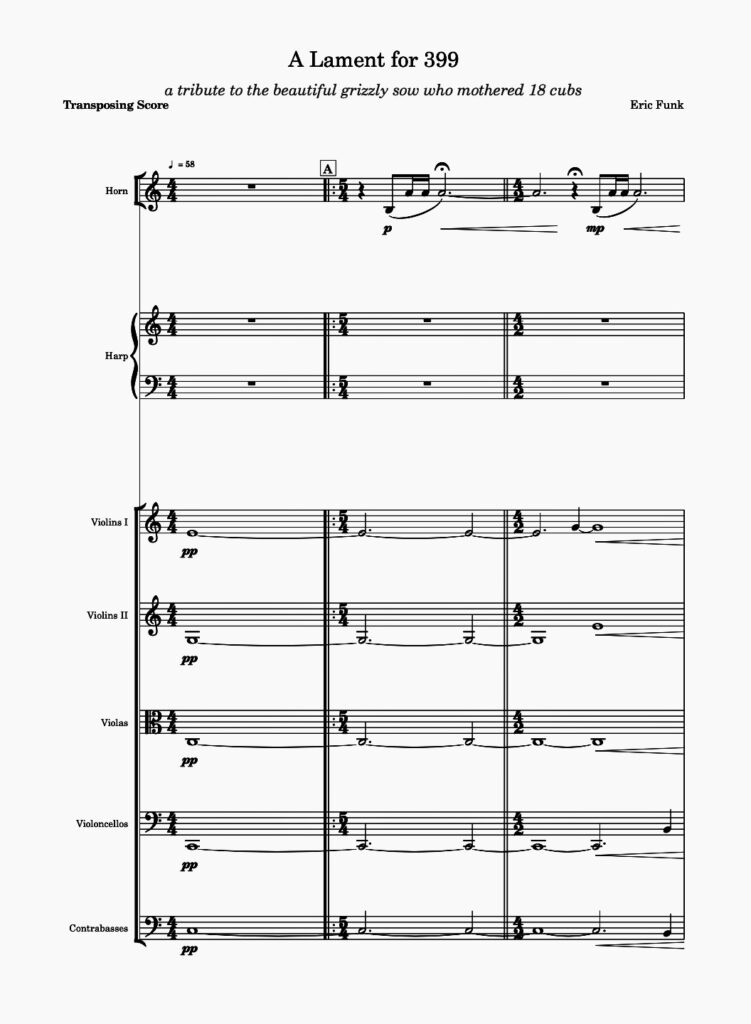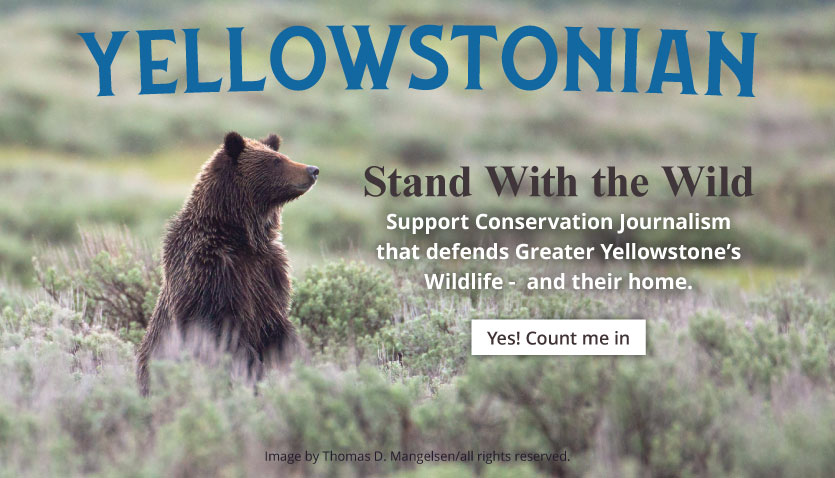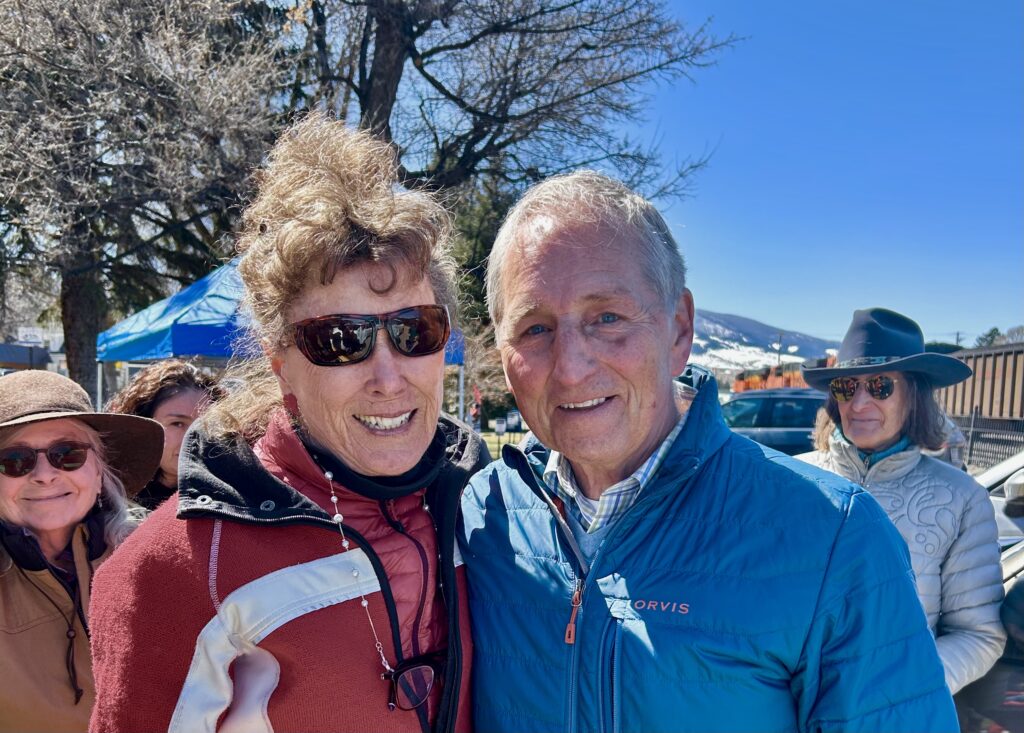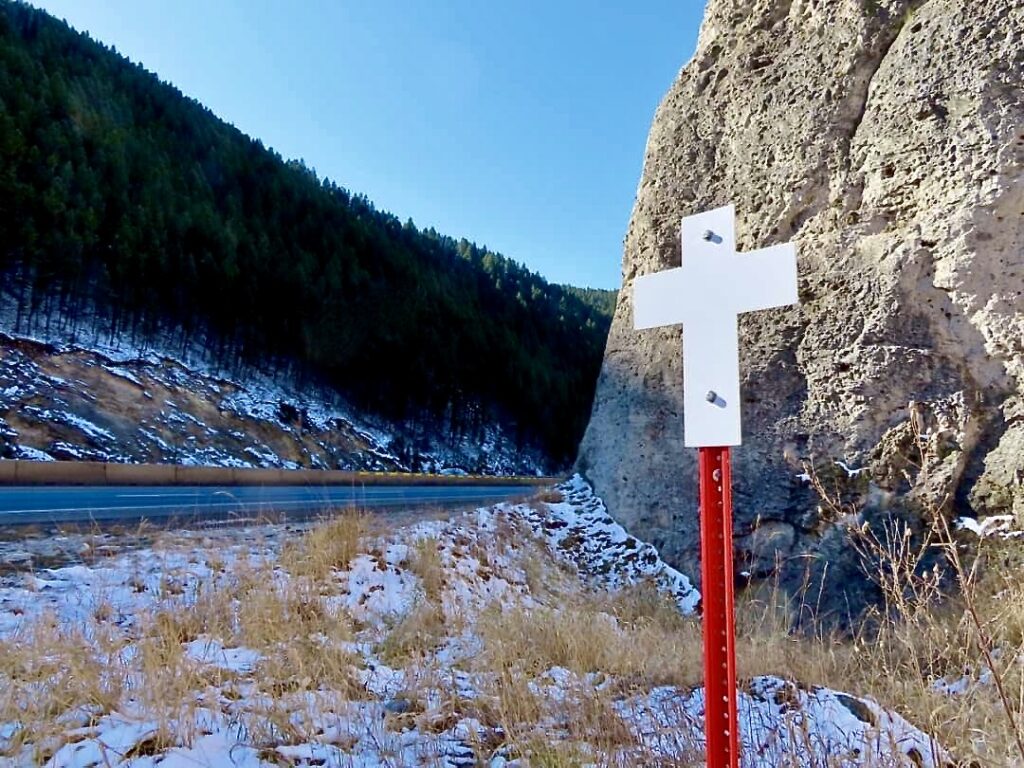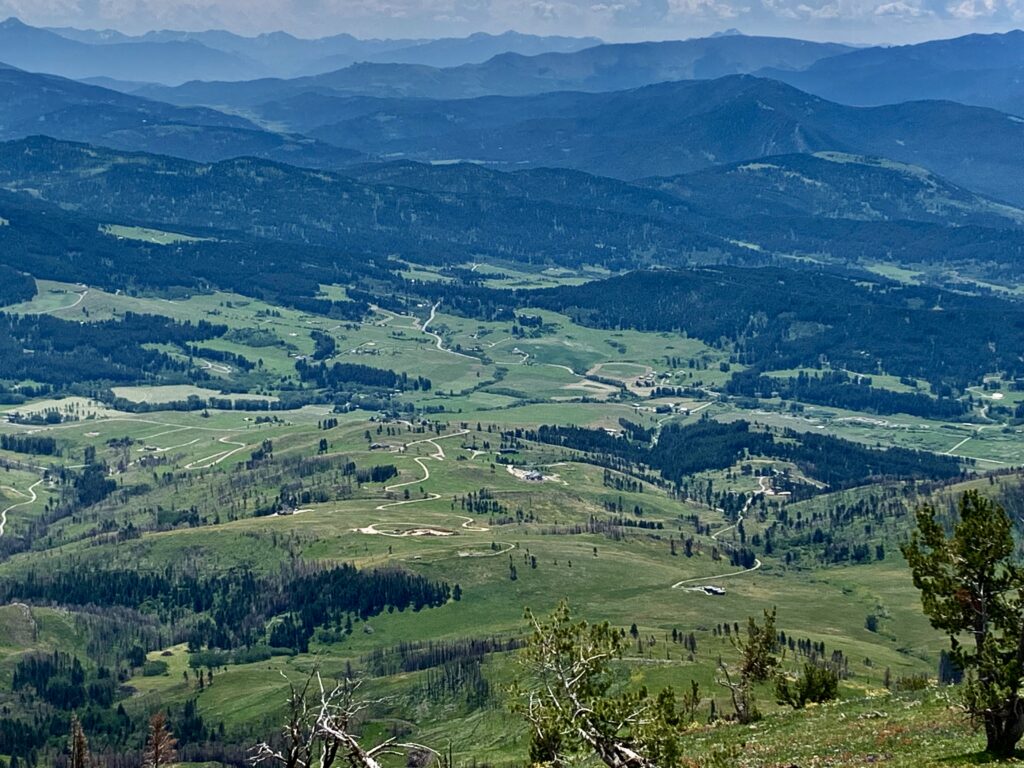by Todd Wilkinson
Where words fall short in delivering a full explanation of feelings, we can turn to the senses to find meaning. Below, enjoy Eric Funk’s original composition, A Lament for Grizzly 399, featuring French horn and strings, paired with awe-inspiring footage of the famous Jackson Hole grizzly mother and her cubs gathered by videographer Sandy Mell and editor Greg Balvin.
Moving, it’s a feast of sight and sound and becomes more affecting with each listen. Together the collaboration is not only a powerful unspoken tribute to 399, but an homage to sentience in the animal world. Fittingly, several of Mell’s and Balvin’s vignettes show the famed matriarch and differing sets of cubs moving through the environs of Pilgrim Creek in Grand Teton National Park where her ashes were spread the week following her tragic death on October 22, 2024 at the age of 28.
We at Yellowstonian are proud to present this paean, fitting for our mission: when it comes to better informing the public about the fragility, grandeur and pricelessness of Greater Yellowstone and the West, we try to deliver content that you cannot forget, unsee or, in this case, unhear. Listen closely to Funk’s performance of the score and you’ll detect the intermittent thrum of a single harp midway through, intoning the heartbeat of wildness. If you too are touched by A Lament for Grizzly 399—watch it below—then please share it with friends!
An Interview with Eric Funk, Sandy Mell, and Greg Balvin
TODD WILKINSON/YELLOWSTONIAN: You are a Greater Yellowstone-based composer. Tell us, Eric Funk, about what 399 represents to you and what went into your thinking with assembling this musical arrangement?
ERIC FUNK: Thinking about the tragic death of 399 cracked me wide open. As I thought about her leaving, her nobility, strength, endurance, freedom and vulnerability in the forest brought music immediately into my imagination. I wrote it down exactly as I heard it in my mind’s ear. I mourn the loss but also wanted to lift her spirit high into the air. This music attempts to capture both.
YELLOWSTONIAN: Sandy and Greg, your footage is stunning and offers a joyous, reflective tribute to 399—a perfect pairing with Eric Funk’s original composition. What kind of emotions welled up as you perused thousands of hours of video you have of her in all seasons and weather conditions, and in the company of different cubs?
SANDY MELL: To be honest, my emotions were overwhelmingly full of love, connection and respect for such a magnificent creature. Every time I saw her, my heartbeat went crazy and my hands shook. I’m surprised it doesn’t show on our videos.
GREG BALVIN: Grizzly 399 made me feel like we’re family in a larger community of beings. When I was in her presence, I felt a deeper connection to the land. She would gaze directly at me, unlike other bears— often we shared a look of mutual recognition, giving me a great sense of joy.
“As I thought about her leaving, her nobility, strength, endurance, freedom and vulnerability in the forest brought music immediately into my imagination. I wrote it down exactly as I heard it in my mind’s ear. I mourn the loss but also wanted to lift her spirit high into the air. This music attempts to capture both.“
—Classical composer Eric Funk
YELLOWSTONIAN: As we look forward and think ahead, what is the best way for the public to honor her, those bears in her bloodline still out on the landscape and other grizzlies in Greater Yellowstone that will be facing a deepening array of human pressures, some that involve permanent loss of habitat?
BALVIN: The best way to honor 399 is to keep her story alive. However, we need to promote grizzlies and yet decrease human pressure we are imposing on them. This may require limiting visitation to the parks during certain times of the year. Outside the parks, it will be necessary to really try to co-exist with bears by giving them space they need and by us living smarter. Human attitudes and our habits will need to change because the bears’ won’t.
MELL: Bringing more awareness of her greatness and educating the public about the need to behave responsibly in the way we interact with nature is the only way we will truly honor her. We are more knowledgeable about grizzlies than before she intersected with us over the long span of her life. We need to support and donate to the nonprofits and agencies that have the ability to fight for wildlife’s right to be on the landscape and those who play a vital role in habitat protection.
YELLOWSTONIAN: Eric, great composers across time have constantly referenced Nature, allegorically and through instrumental mimicry of the soundscape it brings into our lives—a contrast to the cacophony of modernity. What has Nature brought to your life and what are the delights for those willing to see and to listen?
FUNK: Now that I’m retired I spend as much time in the high country, the deep woods, following game trails. I have no destination. I’m just most at peace when I’m in Nature. The music that I compose has almost entirely been conceived of in Nature. I try to capture the energy of those spaces and translate it to classical music.

Composer Eric Funk, above, was born in Montana in 1949. He studied composition with Tomas Svoboda, Sandor Veress, and Krzysztof Penderecki and interviewed Nadia Boulanger in Paris (1977) specific to her composition pedagogy. Dr. Funk is artistic director and host for Montana PBS-TV “11th & Grant with Eric Funk,” a 12-time Emmy Award winning showcase and four-time NETA Award (National Educational Television Association) for “Best Entertainment Program in the U.S. Regardless of Market Size,” now in its 16th season. Funk is also emeritus music/artistic director for the Big Sky Classical Music Festival [Big Sky, Montana], now in its eleventh season and he taught music in colleges for 50 years, 20 of those at Montana State University where he was awarded an honorary doctorate in 2023. In all, Funk has composed 170 major works, one third of which were commissioned, including nine symphonies, four operas, nineteen concertos, six string quartets, numerous large and small choral works and chamber works. Recordings of his work include the Warsaw Philharmonic; Czech Radio Symphony Orchestra; Latvian National Symphony Orchestra; Moscow String Quartet, Moyzes String Quartet; and, Elizabeth Croy, soprano, with Dr. Gregory Young, clarinet, and the Meritage String Quartet.

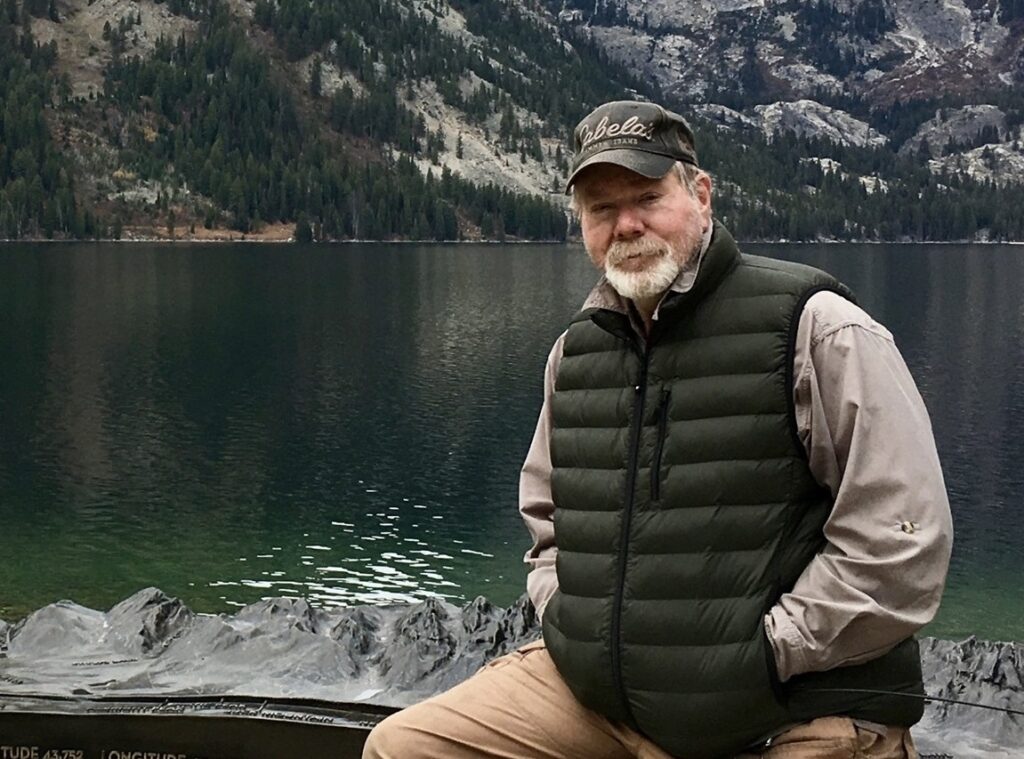
Sandy Mell and Greg Balvin, partners and avid naturalists, have spent hundreds of days, from dawn until past dusk, gathering footage of Grizzly 399, other bears and wildlife in Grand Teton National Park and the larger realm of Jackson Hole. Their library of video footage focused on 399 is unsurpassed. You can see more of it by clicking here. Mell describes herself as “just a hippie mountain girl at heart.” She and Balvin currently live in a quiet community south of Jackson Hole and she devotes herself to celebrating wildlife and wild places in an attempt to engender more public respect for them. Balvin says his love for the mountains brought him to Colorado in 1973. He spent 42 years exploring Rocky Mountain National Park and then settled in Northwest Wyoming about a decade ago. He has been a professional wildlife photographer and videographer for 47 years.
